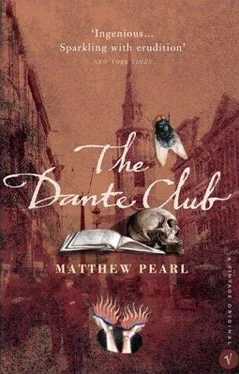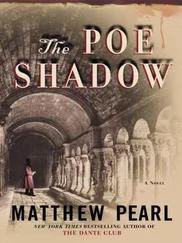* * *
Lowell anxiously departed Elmwood for their Craigie House rendezvous and was the first to greet Longfellow. Lowell did not notice, on the way, that the police guards in front of Elmwood and Craigie House were nowhere to be seen. Longfellow was just finishing reading a story to Annie Allegra. He excused her to the nursery.
Fields arrived soon after.
But twenty minutes passed without word of Oliver Wendell Holmes or Nicholas Rey.
“We shouldn’t have left Rey’s side,” Lowell muttered into his mustache.
“I can’t understand why Wendell wouldn’t have come by now,” said Fields nervously. “I stopped at his house on my way, and Mrs. Holmes said he had already departed.”
“It hasn’t been very long,” said Longfellow, but his eyes did not move from his clock.
Lowell dropped his face into his hands. When he peered out between them, another ten minutes were gone. When he closed himself in again, he was suddenly hit by a chilling thought. He rushed to the window. “We must find Wendell at once!”
“What’s wrong?” asked Fields, alarmed at the look of horror on Lowell’s face.
“It’s Wendell,” Lowell said, “I called him a traitor at the Corner!”
Fields smiled gently. “That is long forgotten, my dear Lowell.”
Lowell grabbed his publisher’s coat sleeve for balance. “Don’t you see? I had my row with Wendell at the Corner the day Jennison was found shredded, the night Holmes walked out from our project. Teal, or rather Galvin, was just coming down the hall. He must have been listening in on us the whole time, just as he would have done at Harvard’s board meetings! I chased Holmes into the hall from the Authors’ Room to yell after him—don’t you remember what I said? Can’t you hear the words still? I told Holmes he was betraying the Dante Club . I said he was a traitor!”
“Brace yourself, please,” said Fields.
“Greene preached to Teal, and Teal followed up with murders. I condemned Wendell as a traitor: Teal was the vigilant audience for my little sermon!” cried Lowell. “Oh, my dear friend, I’ve done him in. I’ve murdered Wendell!”
Lowell rushed into the front hall for his coat.
“He’ll be here any moment, I’m sure,” said Longfellow. “Please, Lowell, let us wait for Officer Rey at least.”
“No, I’m going to find Wendell right now!”
“But where do you mean to find him? And you can’t go alone,” said Longfellow. “We’ll come.”
“I’ll go with Lowell,” Fields said, gathering up the police rattle left by Rey and shaking it to show that it worked well. “I’m sure everything’s fine. Longfellow, will you wait here for Wendell? We’ll send the patrol officer to fetch Rey at once.”
Longfellow nodded.
“Come then, Fields! Now!” roared Lowell, on the verge of crying.
Fields tried to keep up with Lowell as he ran down the front walkway to Brattle Street. There was no sign of anyone.
“Now, where in the deuce is that patrolman?” Fields asked. “The street looks entirely empty…”
A rustling noise sounded in the trees behind Longfellow’s high fence. Lowell put a finger to his lips to signal Fields for quiet and crept closer to the sound, where he waited frozen in suspense.
A cat sprang into view at their feet and then raced off, dissolving into the darkness. Lowell let out a sigh of relief, but just then a man came hurtling down over the fence and struck a crashing blow to Lowell’s head. Lowell collapsed all at once, like a sail whose mast had cracked in two; the poet’s face was so inconceivably motionless on the ground as to be almost unrecognizable to Fields.
The publisher backed away, then looked up and met the gaze of Dan Teal. They moved in tandem, Fields backward and Teal forward in a curiously gentle dance.
“Mr. Teal, please.” Fields’s knees bent inward.
Teal stared impassively.
The publisher tripped over a fallen branch, then turned and launched into a clumsy run. He puffed his way down Brattle, faltering as he went, trying to call out, to scream, but only producing a rough, hoarse caw lost in the frigid winds shrieking in his ears. He looked back, then he drew the police rattle from his pocket. There was no longer any sign of his pursuer. As Fields turned to look over his other shoulder, he felt his arm being grabbed, and he was flung hard through the air. His body went tumbling to the street, the rattle slipping into the bushes with a soft jingle, soft as a bird’s chirp.
Fields stretched his neck toward Craigie House with excruciating stiffness. A warm gaslight glow escaped Longfellow’s study windows, and Fields seemed instantly to know the whole purpose of his assassin.
“Only, don’t hurt Longfellow, Teal. He’s left Massachusetts today—you’ll see. I vow to you on my honor,” Fields blubbered like a child.
“Have I not always done my duty?” The soldier raised his bludgeon high over his head and struck.
* * *
Reverend Elisha Talbot’s successor had completed some meetings with deacons at the Second Unitarian Church of Cambridge several hours before Dr. Oliver Wendell Holmes, armed with his ancient musket and a kerosene lantern he had secured from a pawnshop, stepped into the church and sneaked into the underground vault. Holmes had debated with himself whether to share his theory with the others, but decided to confirm it first for himself. If Talbot’s underground vault was indeed connected to an abandoned fugitive-slave tunnel, this could lead the police right to the killer. It would also explain how Lucifer had entered the burial vault in advance, murdered Talbot, and fled without witnesses. Dr. Holmes’s intuition had launched the Dante Club into its murder inquiries, although it required the urging of Lowell to follow through; why shouldn’t he be the one to point them to an end?
Holmes descended into the vault and fondled the walls of the tomb for any sign of an opening into another tunnel or chamber. He did not find the passageway with his searching hands but with the toes of his boot, which by sheer accident kicked into a hollow gap. Holmes bent down to examine it and found a narrow space. His compact body fit snugly into the hollow, and he dragged his lantern in after him. After he had spent some time on hands and knees, the height of the tunnel increased and Holmes could stand up quite comfortably. He would return at once to proper ground, he decided. Oh how the others would smile at his discovery. How swiftly their adversary would now see defeat! But the sharp turns and slopes of the labyrinth left the little doctor disoriented. He rested a hand on his coat pocket, on the handle of his musket, to feel safe, and had begun to regain his inner compass when a voice scattered all his senses. “Dr. Holmes,” said Teal.
Benjamin Galvin enlisted at Massachusetts’s first call for soldiers. At twenty-four, he had already considered himself a soldier for some time, having helped conduct fugitive slaves through the city’s network of shelters, sanctuaries, and tunnels during the years before war officially came upon them. He was also among those volunteers who escorted anti-slavery speakers in and out of Faneuil Hall and other lyceums, serving as one of the human shields against rock-hurling, brick-tossing mobs.
Galvin, admittedly, was not political in the manner of other young men. He could not read the heavy broadsides and newspapers on whether this or that political scalawag should be voted out or how this or that party or state legislature had cried secession or conciliation. But he understood the stump speakers who declared that an enslaved race must be made free and the guilty parties submitted to rightful punishment. And Benjamin Galvin understood simply enough, too, that he might not return home to his new wife: If he did not come back holding the Stars and Stripes, the recruiters promised, he’d come back wrapped in it. Galvin had never been photographed before, and the one picture taken upon enlistment disappointed him. His cap and trousers appearing ill-fitting; his eyes seeming unaccountably frightened.
Читать дальше












